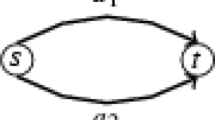Abstract
The minmax regret problem for combinatorial optimization under uncertainty can be viewed as a zero-sum game played between an optimizing player and an adversary, where the optimizing player selects a solution and the adversary selects costs with the intention of maximizing the regret of the player. The conventional minmax regret model considers only deterministic solutions/strategies, and minmax regret versions of most polynomial solvable problems are NP-hard. In this paper, we consider a randomized model where the optimizing player selects a probability distribution (corresponding to a mixed strategy) over solutions and the adversary selects costs with knowledge of the player’s distribution, but not its realization. We show that under this randomized model, the minmax regret version of any polynomial solvable combinatorial problem becomes polynomial solvable. This holds true for both interval and discrete scenario representations of uncertainty. Using the randomized model, we show new proofs of existing approximation algorithms for the deterministic model based on primal-dual approaches. We also determine integrality gaps of minmax regret formulations, giving tight bounds on the limits of performance gains from randomization. Finally, we prove that minmax regret problems are NP-hard under general convex uncertainty.
Research supported in part by NASA ESTOs Advanced Information System Technology (AIST) program under grant number NNX12H81G. Also supported by NSF grant 1029603, ONR grant N00014-12-1-0033, and AFOSR grant FA9550-12-1-0136.
Lawrence Livermore National Laboratory is operated by Lawrence Livermore National Security, LLC, for the U.S. Department of Energy, National Nuclear Security Administration under Contract DE-AC52-07NA27344.
Access this chapter
Tax calculation will be finalised at checkout
Purchases are for personal use only
Similar content being viewed by others
References
Aissi, H., Bazgan, C., Vanderpooten, D.: Complexity of the min-max and min-max regret assignment problems. Oper. Res. Lett. 33(6), 634–640 (2005)
Aissi, H., Bazgan, C., Vanderpooten, D.: Complexity of the min-max (regret) versions of cut problems. In: Deng, X., Du, D.-Z. (eds.) ISAAC 2005. LNCS, vol. 3827, pp. 789–798. Springer, Heidelberg (2005)
Aissi, H., Bazgan, C., Vanderpooten, D.: Approximating min-max (regret) versions of some polynomial problems. In: Chen, D.Z., Lee, D.T. (eds.) COCOON 2006. LNCS, vol. 4112, pp. 428–438. Springer, Heidelberg (2006)
Aissi, H., Bazgan, C., Vanderpooten, D.: Approximation of min-max and min-max regret versions of some combinatorial optimization problems. Eur. J. Oper. Res. 179(2), 281–290 (2007)
Aissi, H., Bazgan, C., Vanderpooten, D.: Min-max and min-max regret versions of combinatorial optimization problems: a survey. Eur. J. Oper. Res. 197(2), 427–438 (2009)
Aissi, H., Bazgan, C., Vanderpooten, D.: General approximation schemes for min-max (regret) versions of some (pseudo-) polynomial problems. Discrete Optim. 7(3), 136–148 (2010)
Averbakh, I.: On the complexity of a class of combinatorial optimization problems with uncertainty. Math. Program. 90(2), 263–272 (2001)
Averbakh, I., Lebedev, V.: Interval data minmax regret network optimization problems. Discrete Appl. Math. 138(3), 289–301 (2004)
Averbakh, I., Lebedev, V.: On the complexity of minmax regret linear programming. Eur. J. Oper. Res. 160(1), 227–231 (2005)
Bertsimas, D., Nasrabadi, E., Orlin, J.B.: On the power of nature in robust discrete optimization (2013, working papers)
Bertsimas, D., Nasrabadi, E., Orlin, J.B.: On the power of randomization in network interdiction. arXiv preprint (2013). http://arxiv.org/abs/1312.3478
Bertsimas, D., Sim, M.: The price of robustness. Oper. Res. 52(1), 35–53 (2004)
Birge, J.R., Louveaux, F.V.: Introduction to Stochastic Programming. Springer, New York (1997)
Grötschel, M., Lovász, L., Schrijver, A.: The ellipsoid method and its consequences in combinatorial optimization. Combinatorica 1(2), 169–197 (1981)
Immorlica, N., Kalai, A.T., Lucier, B., Moitra, A., Postlewaite, A., Tennenholtz, M.: Dueling algorithms. In: Proceedings of the Forty-Third annual ACM Symposium on Theory of Computing, pp. 215–224. ACM (2011)
Johannes, B., Orlin, J.B.: Minimax regret problems are harder than minimax problems (2012, working papers)
Kasperski, A.: Discrete Optimization with Interval Data. STUDFUZZ, vol. 228. Springer, Heidelberg (2008)
Kasperski, A., Kurpisz, A., Zieliński, P.: Approximating the min-max (regret) selecting items problem. Inf. Process. Lett. 113(1), 23–29 (2013)
Kasperski, A., Zieliński, P.: An approximation algorithm for interval data minmax regret combinatorial optimization problems. Inf. Process. Lett. 97(5), 177–180 (2006)
Kasperski, A., Zieliński, P.: On the existence of an fptas for minmax regret combinatorial optimization problems with interval data. Oper. Res. Lett. 35(4), 525–532 (2007)
Kiekintveld, C., Jain, M., Tsai, J., Pita, J., Ordóñez, F., Tambe, M.: Computing optimal randomized resource allocations for massive security games. In: Proceedings of The 8th International Conference on Autonomous Agents and Multiagent Systems, vol. 1, pp. 689–696. International Foundation for Autonomous Agents and Multiagent Systems (2009)
Korzhyk, D., Conitzer, V., Parr, R.: Complexity of computing optimal stackelberg strategies in security resource allocation games. In: Twenty-Fourth AAAI Conference on Artificial Intelligence (2010)
Kouvelis, P., Yu, G.: Robust Discrete Optimization and Its Applications. Springer, New York (1997)
Mastin, A., Jaillet, P., Chin, S.: Randomized minmax regret for combinatorial optimization under uncertainty. arXiv preprint (2014). http://arxiv.org/abs/1401.7043
Savage, L.J.: The theory of statistical decision. J. Am. Stat. Assoc. 46(253), 55–67 (1951)
Shapiro, A., Dentcheva, D., Ruszczyński, A.P.: Lectures on Stochastic Programming: Modeling and Theory. SIAM, Philadelphia (2009)
Wald, A.: Contributions to the theory of statistical estimation and testing hypotheses. Ann. Math. Stat. 10(4), 299–326 (1939)
Yu, G., Yang, J.: On the robust shortest path problem. Comput. Oper. Res. 25(6), 457–468 (1998)
Author information
Authors and Affiliations
Corresponding author
Editor information
Editors and Affiliations
Rights and permissions
Copyright information
© 2015 Springer-Verlag Berlin Heidelberg
About this paper
Cite this paper
Mastin, A., Jaillet, P., Chin, S. (2015). Randomized Minmax Regret for Combinatorial Optimization Under Uncertainty. In: Elbassioni, K., Makino, K. (eds) Algorithms and Computation. ISAAC 2015. Lecture Notes in Computer Science(), vol 9472. Springer, Berlin, Heidelberg. https://doi.org/10.1007/978-3-662-48971-0_42
Download citation
DOI: https://doi.org/10.1007/978-3-662-48971-0_42
Published:
Publisher Name: Springer, Berlin, Heidelberg
Print ISBN: 978-3-662-48970-3
Online ISBN: 978-3-662-48971-0
eBook Packages: Computer ScienceComputer Science (R0)




